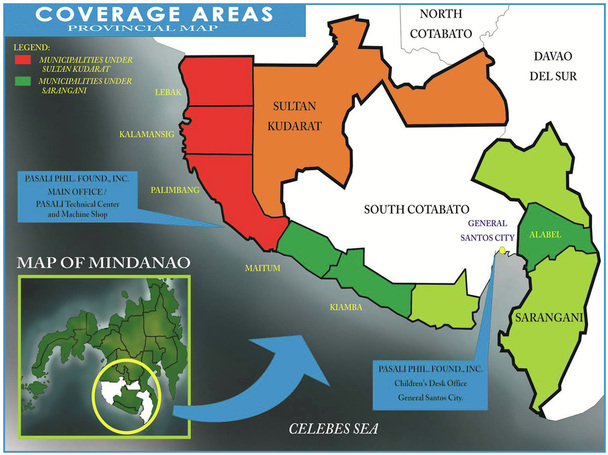Farm Support Scheme - System of Rice Intensification
Farm Support Scheme |
System of Rice Intensification |
|
The Farm Support Scheme is a multifaceted scheme that emerged as a result of PASALI agricultural experimentations on sustainable agriculture, System of Rice Intensification, and various farmer support schemes from 2005 to 2009. It is a direct result of PASALI's brain gain concept that won an idea contest in 2003.
FSS-SRI consists of 12 intervention activities and trainings on interconnected topics: e.g. methods and procedures of SRI, skills development, financial literacy, gender sensitivity, peacebuilding, technical assistance, farm loans and marketing support; all concrete responses to the identified problems of rural communities. PASALI facilitated the creation of 11 farmer cooperatives in Palimbang, Sultan Kudarat from 2009 - 2011. Cooperatives have 15 - 45 members, making the total of SRI farmers in Palimbang to over 300. PASALI and the cooperatives are now working on the recognition of these cooperatives by DOLE and CDA. |
SRI is a set of alternative crop management practices, developed in the 1980s in Madagascar to benefit small farmers. It increases rice productivity, while reducing requirements for water, seed, synthetic fertilizers, pesticides, herbicides and labor. SRI offers an opportunity for rice-producing countries to enable small farmers to be more productive, secure, and self-reliant, while buffering and even reversing the trends that contribute to climate change though minimal use of water in rice production.
The basic principles of SRI includes: transplanting seedlings much earlier than in conventional methods; planting only one seedling per hill, rather than a handful; spacing plants wider apart than in conventional methods and arranging them in a square pattern; applying water intermittently instead of continuous flood irrigation; using rotary weeding to control weeds and promote soil aeration; and applying organic fertilizers to enhance soil fertility and yield. |
Pasali Experienced in SRI
Pasali's experience in SRI was substantial. It introduced SRI in Palimbang sometime in 2006. In 2009, three (3) farmers were sent to Cambodia to further enhance their SRI knowledge. Farmers and rice experts from different parts of the Philippines visited Palimbang to learn and study Pasali's SRI practices. The Appropriate Technology and Innovative Development (ATINDev) program of Pasali, further developed appropriate tools and equipment for the enhancement of SRI practice. One of the appropriate technologies is the Manual Weeder which is now popularly in demand.
Pasali tested and demonstrated a variation of SRI approach for six years and firmly believed that 150 sacks (7.5 ton) of rice production or more per hectare is possible. Further, per hectare production costs were reduced with 50%. In Palimbang, the normal costs of production per hectare is between Php 18,000 to Php 25,000.
Pasali tested and demonstrated a variation of SRI approach for six years and firmly believed that 150 sacks (7.5 ton) of rice production or more per hectare is possible. Further, per hectare production costs were reduced with 50%. In Palimbang, the normal costs of production per hectare is between Php 18,000 to Php 25,000.
Rotary Weeder & Farm Implements
PASALI designs and fabricates farm implements for farmers practicing SRI. This includes manual and mechanized rotary weeder, and various pre-production implements such as the plainer or the sanro. PASALI's Technical Center makes also available farm machines to rice farmers, such as tractors.
Project Expansion
PASALI has begun its extension of the FSS-SRI to Sarangani (Maitum and Kiamba), and Sultan Kudarat (Kalamansig and Lebak). The farmer group in Kiamba consists of tribes of the Sangil, while the farmers in Lebak and Kalamansig are Moro and Indigenous groups (mainly Manobo).
PASALI has begun its extension of the FSS-SRI to Sarangani (Maitum and Kiamba), and Sultan Kudarat (Kalamansig and Lebak). The farmer group in Kiamba consists of tribes of the Sangil, while the farmers in Lebak and Kalamansig are Moro and Indigenous groups (mainly Manobo).
|
Pasali Philippines Foundation, 2005-2017 | Registered non-profit SEC CN200525083 | TIN 005-979-086 Telephone (+63) (083) 826-0008 | Email [email protected] | Door 8, 2nd Floor WL Bldg., Nat'l Highway, Prk. Veterans, Brgy. Calumpang, General Santos City, Mindanao, Philippines | Support our work
|
Migrants’ initiative transforms community through enterprise, technology and people empowerment



